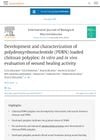 December 2023 in “Materials Today Sustainability”
December 2023 in “Materials Today Sustainability” Scientists made glow-in-the-dark dots from human hair that can detect iron, prevent counterfeiting, and reveal fingerprints.
 November 2023 in “Stem cells and cloning”
November 2023 in “Stem cells and cloning” A new treatment using stem cell-conditioned media significantly improved hair growth in people with temporary hair loss.
 October 2023 in “Journal of Drug Delivery Science and Technology”
October 2023 in “Journal of Drug Delivery Science and Technology” Electrospun nanofibers might be a promising new treatment for hair loss.
 September 2023 in “Nature Communications”
September 2023 in “Nature Communications” Immune cells are essential for skin regeneration using biomaterial scaffolds.
 September 2023 in “International journal of biological macromolecules”
September 2023 in “International journal of biological macromolecules” The chitosan/PDRN polyplex improved wound healing in diabetic rats.
IVL-DrugFluidic® can mass-produce high-quality, long-acting injectable drug microspheres, improving patient compliance and reducing side effects.
 January 2023 in “International journal of dermatology, venereology and leprosy sciences”
January 2023 in “International journal of dermatology, venereology and leprosy sciences” Microneedling is an effective and tolerable way to treat vitiligo.
 June 2022 in “Scientific Reports”
June 2022 in “Scientific Reports” Prevelex, a polyampholyte, can create a cell-repellent coating on microdevices, which can be useful in biomedical applications like hair follicle regeneration.
December 2021 in “Pathologica” Trichogerminoma is a rare, benign skin tumor from hair cells, with a small risk of becoming cancerous.
November 2013 in “Journal of clinical & experimental dermatology research” The follicular unit extraction method for hair transplants is a technique with benefits and drawbacks.
Modern shampoos use a mix of surfactants and other ingredients to clean, reduce irritation, and improve performance.
April 2023 in “International Journal of Pharmaceutics” Melatonin in a special emulsion can help treat hair loss more effectively.
April 2023 in “Highlights in Science, Engineering and Technology” 517 citations,
February 2010 in “Materials” Keratin from hair and wool is used in medical materials for healing and drug delivery.
203 citations,
May 2017 in “Journal of controlled release” Microneedles are being used and tested for various medical and cosmetic treatments.
182 citations,
November 2018 in “Cosmetics” Seaweeds have beneficial compounds for skin care, including anti-aging and protective effects.
135 citations,
December 2006 in “PLoS Medicine” Hyaluronate fragments can help reverse skin thinning by working with the CD44 receptor.
129 citations,
July 2019 in “Stem Cell Research & Therapy” Epidermal stem cells help heal severe skin wounds and have potential for medical treatments.
122 citations,
April 2020 in “American Journal Of Pathology” Skin aging is a complex process influenced by various factors, leading to wrinkles and sagging, and should be considered a disease due to its health impacts.
115 citations,
August 2014 in “Jo'jig gonghag gwa jaesaeng uihag/Tissue engineering and regenerative medicine” Human hair keratin can be used in many medical applications.
99 citations,
May 1998 in “Journal of biological chemistry/The Journal of biological chemistry” Small proline-rich proteins and trichohyalin help make epithelial tissues tougher and more flexible.
 86 citations,
August 2021 in “Polymers”
86 citations,
August 2021 in “Polymers” Microneedles are effective for drug delivery, vaccinations, fluid extraction, and treating hair loss, with advancements in manufacturing like 3D printing.
86 citations,
April 2009 in “Journal of anatomy” Hard skin features like scales, feathers, and hair evolved through specific protein changes in different animal groups.
84 citations,
April 2015 in “Cosmetics” Hair dyes vary in how long they last and how deeply they penetrate hair.
83 citations,
August 2020 in “Resources” Macroalgae compounds offer sustainable, effective benefits for cosmetics.
81 citations,
December 2007 in “Acta materialia” AFM helped show how hair changes under tension and the effects of damage and conditioner.
 79 citations,
January 2018 in “Wiley Interdisciplinary Reviews-Developmental Biology”
79 citations,
January 2018 in “Wiley Interdisciplinary Reviews-Developmental Biology” Understanding how baby skin heals without scars could help develop treatments for adults to heal wounds without leaving scars.
69 citations,
December 2015 in “BMC plant biology” Three genes in Arabidopsis are important for plant growth and development by affecting sugar attachment to proteins.
 68 citations,
March 2018 in “Biomaterials”
68 citations,
March 2018 in “Biomaterials” Large-scale fibronectin nanofibers help heal wounds and repair tissue in a skin model of a mouse.
63 citations,
May 2015 in “PloS one” GALT5 and GALT2 are important for plant growth and development because they help with protein glycosylation.









